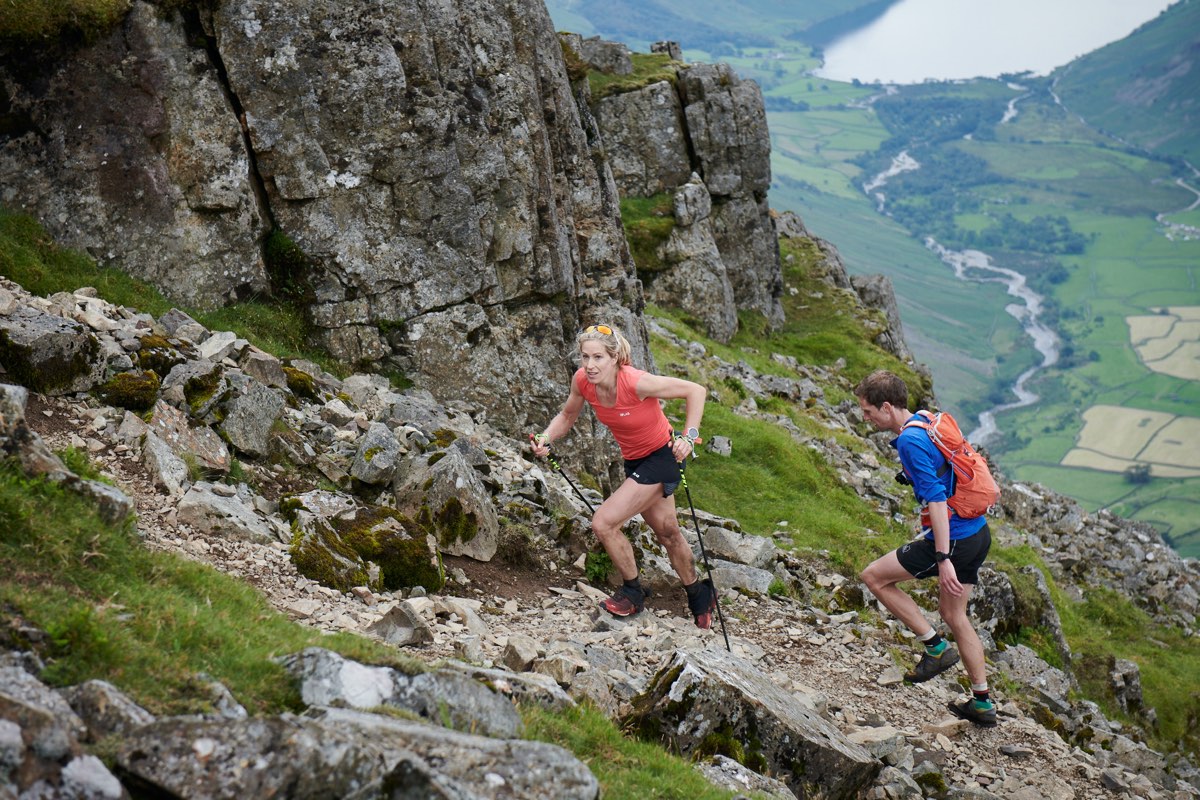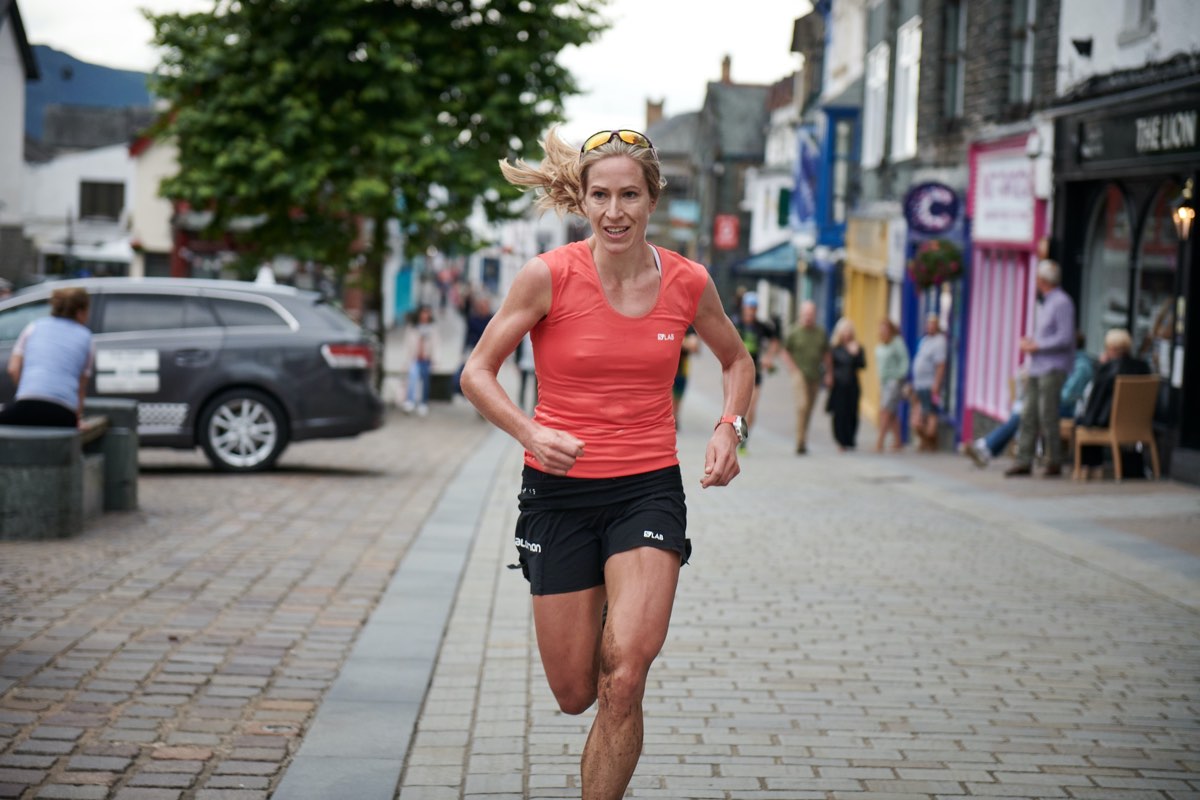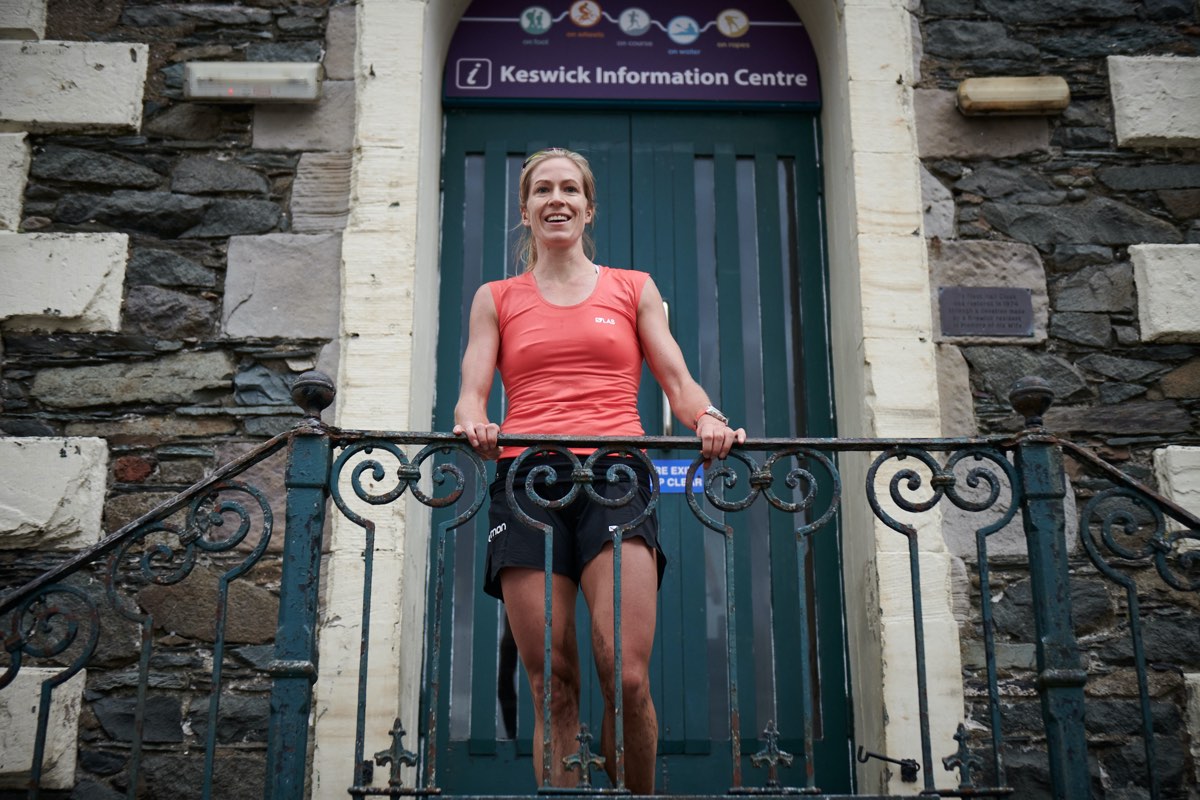On Friday, July 24, Beth Pascall set a new women’s fastest known time of 14 hours, 34 minutes, and 26 seconds on the Bob Graham Round in England’s Lake District. The previous women’s record was set by Jasmin Paris in 2016 at 15:24.
The Bob Graham Round is a loop of 42 fells–or mountains–wherein challengers must tag the fell tops but can travel between them by the best route they determine. The round is about 66 miles long with close to 27,000 feet of climbing, and runners need to complete it in 24 hours to be awarded an official finish by the Bob Graham 24 Hour Club.
This is a transcript of an interview with Beth several days after her finish. In this interview, Beth speaks about why she decided to attempt the Bob Graham Round, how she surprised even herself with her pacing, and what setting the speed record means to her.
iRunFar: Congratulations! How is your recovery going?
Beth Pascall: Physically, I’m fine. The response [by the media] has been a bit overwhelming actually. It means a lot to me, and it means a lot to the fell running community, but I wouldn’t have expected it to mean so much the wider public. I’ve been back at work this week, and it’s also been full on with so many emails and interview requests. I haven’t slept much.
iRunFar: I saw you were on the BBC and in national newspapers in England.
Pascall: Yeah. Totally unexpected.
iRunFar: It’s wonderful when mainstream media picks up on a story about running in nature. You’re now in an amazing position to be able to communicate what’s really special about being out there.
Pascall: I think it is really exciting! Going on BBC Radio 4 here in the U.K. is a big deal. Not just for me but for trail running and fell running in general.

Beth Pascall during her Bob Graham Round fastest known time effort in the Lake District of England. All photos: Sam Benard
iRunFar: Thanks for fitting iRunFar into your schedule! I want to start with the context of these times. With the COVID-19 public health crisis, this must be a strange year for your life, running, and work as a physician? Can you place doing the Bob Graham Round in the context of all this?
Pascall: I had planned a full summer of races abroad and was actually taking some time off work. I’d had six months off work and was going to the U.S., to train for a few months and run the Western States 100. When I realized there were no races for the foreseeable future, the Bob Graham Round was the obvious thing to do. I’ve been training hard for it since March, really. But it wasn’t until the end of May when the U.K. came out of proper lockdown and we could actually run in the mountains that I knew it could happen. Since then, it’s been full on.
iRunFar: You don’t live in the Lake District. You’re how far away? Do you have hills to train on where you live?
Pascall: I live a couple hundred miles away. We have small hills. In lockdown, I was doing loops of my local wood. I can get maybe 150 meters of climbing in one loop.
iRunFar: Just trying to stay fit.
Pascall: Exactly.
iRunFar: What kind of doctor are you? And you went back to work since the COVID-19 crisis began, correct?
Pascall: I’m a pediatrician. As soon as I realized I wasn’t going to the U.S., I went back to work.
iRunFar: What has your work been like amongst all this?
Pascall: The day-to-day work hasn’t changed that much, but the way we do things and the systems have all changed. For example, we’re doing lots of our clinics over the phone and wearing personal protective equipment the whole time [when we see patients in-person].
iRunFar: Once lockdown ended in May, were you able to make some trips to the Lake District for training?
Pascall: Yeah, but until very recently we weren’t allowed to stay overnight anywhere. So once a week I would make my six- or seven-hour roundtrip drive and I would run for eight or 10 hours just to make it worthwhile. There were a lot of Mondays at work when I was so tired!
iRunFar: The Bob Graham Round is fell running, which is different from trail or mountain running. Can you describe what fell running is for those who might not be familiar?
Pascall: So the Bob Graham Round is a loop joining 42 peaks. The only criteria is that you have to go to each one of the peaks. You then take the fastest route between each one, which usually does not involve following a path. There are some paths, but a lot of the time you’re running over heather, really rocky terrain, some grass, lots of bog. There’s a rock climb in there as well. There’s a big navigation component to it, and also about getting to know the route really well. You can’t just rock up with a .gpx file on your watch and do it. You need to know the route super well and you need to be efficient on really technical terrain.
iRunFar: The other thing that I think is really interesting and unique is that in Bob Graham Round tradition, you have a big support team. People out with you and then crews at the different road crossings. What was your team like?
Pascall: I had an amazing team. It was complicated and stressful in that I had my team lined up for Saturday, but then it looked like a [weather] washout that day. In the end, I brought it forward to Friday, but a lot of my original team couldn’t make the Friday. The other complication was that the day before I received an email with the new coronavirus rules [from the Bob Graham 24 Hour Club which manages efforts on the round] stating we were only allowed two supporters per leg. I then had to do even more reshuffling.
iRunFar: The previous record was Jasmin Paris’s from four years ago. Did you go into your effort with splits set up based upon your recceing of the route and just trying to tick away a few minutes on the record? Or how did you set up your goal?
Pascall: Jasmin’s time was 15 hours and 24 minutes and I was on a 15:23 schedule.
iRunFar: Is that right? [laughing]
Pascall: I tweaked Jasmin’s splits slightly based on my splits from my training runs. I’d run each leg, or a maximum of two consecutive legs, exactly at record pace in training.
iRunFar: Then you went out ahead of record pace! You ran the first leg [from the start through the first road crossing] ahead of record pace. I think were you six minutes faster than Jasmin through the first leg?
Pascall: Ten minutes through the first leg. I was six minutes up on the first summit and when I looked at my watch I was like, What have I done? This is exactly the thing you’re not supposed to do. I tried to temper my effort for the rest of the first leg but I think the adrenaline got the better of me. When I arrived at the end of the first leg 10 minutes up, I thought I’d been an idiot.
iRunFar: But on each leg after that, you continued to gain on record pace.
Pascall: I roughly picked up 10 minutes per leg. It wasn’t until near the end of leg four [of five legs] that I thought it was for real. Up until that point I was just waiting for my legs to go. And I was convinced that I was going to blow up because it didn’t make any sense to me.
iRunFar: Did you feel like you couldn’t make your effort any easier but you were still gaining time?
Pascall: It felt like I was running within myself. It didn’t seem like it was a ridiculous pace. Probably if I’d been in a race I would have thought about it, but it’s just because I’m so aware of the splits, that it didn’t seem right. At the end of leg four, I kind of dared to believe that the record was possible. Up until then I was just waiting to fall to pieces.
iRunFar: Each of the five legs have their own character, but in my opinion legs three and four are the hardest. How were they for you?
Pascall: I enjoyed legs three and four probably the most because as you said they are the hardest. The terrain is most technical and I just enjoyed that aspect to it, I guess.
iRunFar: [laughing]
Pascall: There weren’t any really tough parts [to the whole day]. I don’t want to say it was easy because it wasn’t, but I didn’t have a low point. It went pretty smoothly.
iRunFar: How about your food? What did you do for your nutrition and hydration?
Pascall: I had gels. I used the Spring Energy gels. They’re kind of like real food to be honest. I had some Coke at the road crossings. And I drank some carbohydrate drink, Mountain Fuel.
iRunFar: Going for the easy-to-digest stuff?
Pascall: Yeah.
iRunFar: Can you share a little more about what you said a moment ago, that when you finished leg four you realized that maybe everything was for real? It sounds like it was a really cool moment.
Pascall: To be honest, it was one of the best days of my life. When I realized that the record was in sight, and if there were no disasters that I was going to make it, I just relaxed and enjoyed it even more. That leg five, yeah. It was just amazing. Amazing.
iRunFar: What was the reaction among your crew? “Oh, we knew you were going to go this fast.” Or “You are going to do it.” Or were you like, “Okay let’s not talk about this. Let’s just run.” What was that dynamic?
Pascall: They didn’t say this to me but I’m sure they were thinking, She’s gone way too fast. She’ll never keep this up. And then later on I think they were a bit rushed because they weren’t expecting me to come in so early. [laughing]
iRunFar: [laughing] Leg five is interesting because it’s half mountains and then a road run to finish. Did you hammer the road? Were you just pushing for every second? Where was your head at?
Pascall: I was definitely pushing but not to exhaustion, I wouldn’t say.
iRunFar: From the photos of your finish at Moot Hall in Keswick [where the round starts and finishes], it looked like you were very promptly given a large beer.
Pascall: It’s a tradition for the pub opposite of the hall–the pub is called The Round–to bring out a pint for the finisher.
iRunFar: [laughing] Jasmin’s record carried a monumental connotation in fell running. It was so much faster than what other women had done. And you bested that time by 50 minutes. How’s that sitting?
Pascall: It still hasn’t sunk in. As I said before, it was completely unexpected. I think it means more to me than probably any racing results ever have. It feels so good. I think the emotion that I feel having broken the Bob Graham record is in part to do with what’s happened over the previous few months, you know? It’s felt like the last few months have been really tough, not just for me but for everybody. I think that’s in part why the Bob Graham means so much right now. Finally there’s something to celebrate.
For sure it’s made me think about doing more fell running challenges. I realized that I’m better on the fells than I thought I was.
And I think it’s really cool what’s happening in the moment with people breaking [speed records]. I love the way all these records are becoming more competitive, and I think that coronavirus is going to stay around for a while, and no one’s expecting life in the running world to go back to normal. It wouldn’t surprise us if it’s not back to normal next year. I think it’s great for the sport for these records to become more competitive.
From an environmental point of view, it’s felt good to stay more local. I’m realizing there are actually a lot of things in the U.K. that I’d like to do that don’t involve a lot of travel.
iRunFar: I feel like that is a common theme in runners I’m corresponding with around the world these days, that people are realizing the great things close to home.
Pascall: Yeah. I think we end up traveling to races because we want the competition. I love racing, don’t get me wrong. I will be racing as soon as we’re able. But if there are things we can do closer to home like a Bob Graham and if that is a really prestigious record that lots of people have done, then that is competition, you know? That’s a meaningful goal to have.
iRunFar: Do you have any other running plans for this year?
Pascall: I’m going to try to get in something else before the end of the summer whilst we still have some daylight. And like with the Bob Graham I’ll try to keep it under the radar, so I’ll be cryptic.
iRunFar: We’ll find out when we find out. Congratulations to you on your Bob Graham Round speed record and thanks again for the interview!
Pascall: Thank you.



